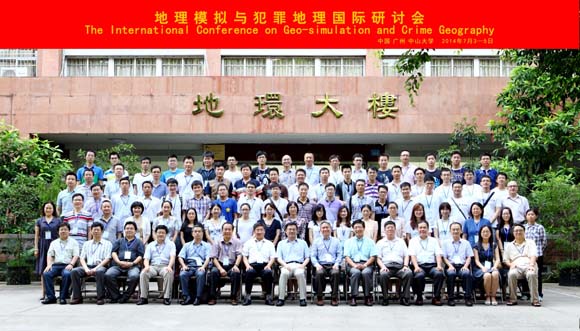The International Conference on Geo-simulation and Crime Geography held at SYSU
Source: School of Geography and Planning
Written by: Xianwei Wang
Edited by: Wang Dongmei
On July 3-5, the International Conference on Geo-simulation and Crime Geography was successfully held in the School of Geography and Planning at Sun Yat-sen University (SYSU), Guangzhou, China. It was sponsored by the School of Geography and Planning and co-sponsored by the State Key Laboratory of Information Engineering in Surveying, Mapping and Remote Sensing at Wuhan University, the School of Earth and Space Sciences at Peking University, the Xinjiang Institute of Ecology and Geography, Chinese Academy of Sciences and the School of Information Science and Technology at Yunnan Normal University. It was organized by the School of Geography and Planning and the Center of Integrated Geographic Information Analysis (CIGNA) at SYSU. More than one hundred experts and scholars from mainland China, Macao, USA, and Australia, attended the meeting.
The theme of the conference consists of four topics, including Crime Geography and Police-Geographic Information System (PGIS), Go-home thematic reports of Chinese Professionals of GIS (CPGIS), Spatial and temporal Geo-simulation, and Smart City. The opening ceremony was presided over by the Conference Chair Lin Liu, Professor and Dean of the School of Geography and Planning and Director of CIGNA. Professor Guangmei Yan, Vice President of SYSU, gave a welcome remark at the opening ceremony.

Group photo
After the opening ceremony, the meeting was followed by seven keynote speeches from professors Daniel Sui from Ohio State University, Hongxing Liu from the University of Cincinnati, Jay Lee from Kent State University, Fazeng Wang from Henan University, Xia Li and Lin Liu from SYSU, and General Engineer Sheng Wang from the Founder Group, a frontier of PGIS in China. Professors Fang Qiu from the University of Texas at Dallas, Xinyue Ye from the Kent State University, and Jianhua Xu from Australia each gave a thematic report in their fields on July 3rd. On the second day, the meeting was dominated by four topics. Professor Jay Lee chaired the PGIS topic; Professor Lin Liu chaired the salon of crime geography in China; professors Xia Li and Xun Shi presided over the CPGIS theme; and professors Kai Liu, Suhong Zhou and Haigang Sui presided over the Geo-simulation and smart city topics respectively.
This meeting was well organized and was unanimously taken for the first Symposium of Crime Geography in China by all the experts attended. Crime geography has been contributing greatly to the societal security and social harmony. It aims to understand and prevent crime from a geographic perspective, which focuses on spatial patterns and spatial processes of crime and related factors. Nowadays, with the explosion of geo-referenced data and rapid development of GIS technologies, crime geography research meets both opportunities and challenges. Nevertheless, it is highly expected to play a much more active role in future crime prevention, especially in the fields of spatial-temporal prediction of crime events, comprehensive evaluation of police operations, and virtual examination of crime theories.